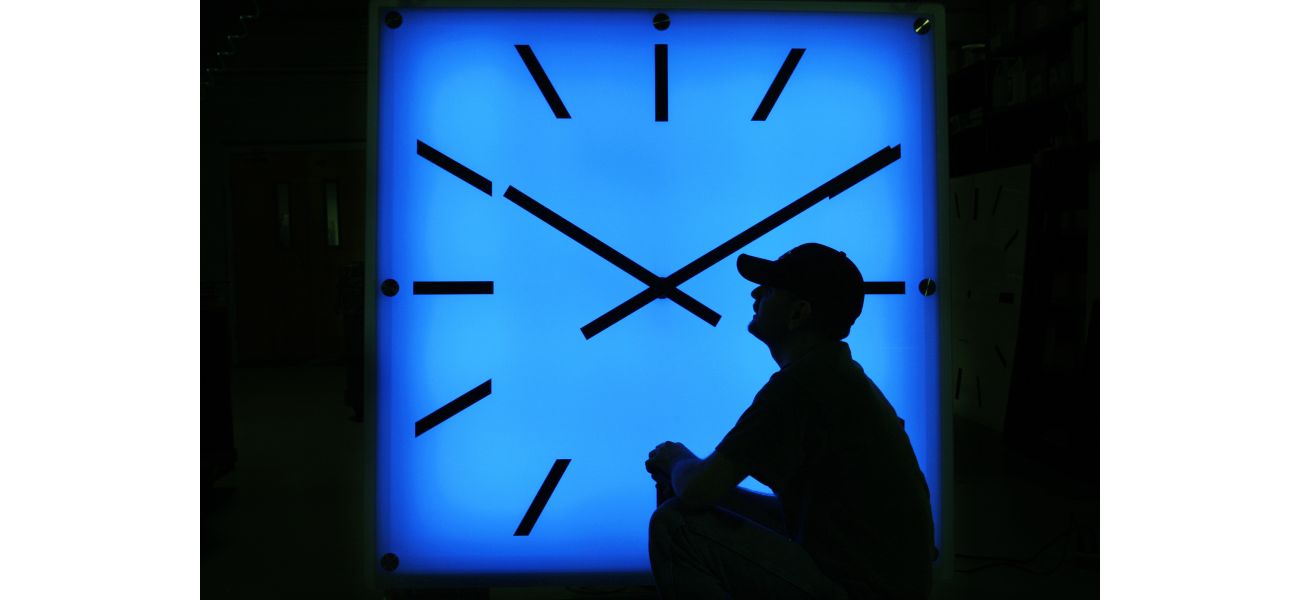Don't forget to turn your clocks back an hour on Sunday when daylight saving time ends.
Is the U.S. planning to eliminate daylight saving time?
November 2nd 2024.

Good news! You are about to gain an entire extra hour of sleep! Unfortunately, the downside is that it will be dark as night by late afternoon for the next few months in the United States. Daylight saving time is coming to an end at 2 a.m. local time on Sunday, which means it's time to set your clocks back one hour before you go to bed. Standard time will then be in effect until March 9th, when we will once again "spring forward" and return to daylight saving time.
The transition to daylight saving time in the spring can be tough on our bodies. The darker mornings and lighter evenings can throw off our internal body clocks, making it difficult to fall asleep at the right time for weeks or even longer. In fact, studies have shown an increase in heart attacks and strokes immediately after the March time change. "Fall back" in the fall may seem easier, but it can still take some time for our sleep habits to adjust. On top of that, there are also the challenges of leaving work in the dark or trying to exercise while there is still some light left. People with seasonal affective disorder, a type of depression that is often linked to the shorter days and lack of sunlight in the fall and winter, may also struggle during this time.
Some health groups, including the American Medical Association and American Academy of Sleep Medicine, have suggested doing away with the time change altogether and sticking with standard time. They argue that this would better align with the natural patterns of the sun and our own biology. Interestingly, most countries around the world do not observe daylight saving time. For the countries that do, mostly in Europe and North America, the date of the clock change varies. Two states in the U.S., Arizona and Hawaii, do not change their clocks and stay on standard time.
So, how does our body react to light and why does the time change affect our sleep? Our brains have a "master clock" that is set by exposure to sunlight and darkness. This circadian rhythm is a 24-hour cycle that determines when we feel sleepy and when we are more alert. This pattern changes as we age, which is why young children who wake up early eventually become teenagers who are difficult to wake up in the morning. Morning light helps reset this rhythm, while evening light suppresses the release of a hormone called melatonin, which triggers drowsiness. So, when we have an extra hour of daylight in the evening due to daylight saving time, it delays the release of melatonin and throws off our circadian rhythm.
The circadian clock not only affects our sleep, but also other bodily functions such as heart rate, blood pressure, stress hormones, and metabolism. Even just a one-hour change on the clock can disrupt our sleep schedules, as our work and school start times stay the same. This is a problem because a large number of people are already sleep deprived. In fact, about one-third of adults in the U.S. get less than the recommended seven hours of sleep each night, and more than half of teenagers don't get the recommended eight hours on weeknights. Sleep deprivation has been linked to various health issues, including heart disease, cognitive decline, and obesity.
Some people try to prepare for the time change by gradually adjusting their bedtimes in the days leading up to it. And there are ways to ease the transition, such as getting more sunlight to help reset our circadian rhythm for healthier sleep. But will the U.S. ever get rid of the time change altogether? Lawmakers have proposed this idea in the past, with a recent bipartisan bill called the "Sunshine Protection Act" suggesting that daylight saving time be made permanent. However, health experts argue that it should be standard time that is made permanent, as it would better align with our natural sleep patterns.
For dairy farmer Aubrey Jarrell in Kentwood, Louisiana, the time change is not a welcome event. He explains that it interferes with his cows' strict milking routine and causes them stress, which is not good for their health. He believes that the time should stay the same, whichever it may be, in order to avoid disrupting his cows' daily routine. Stay updated on the latest news in Colorado by signing up for our daily "Your Morning Dozen" email newsletter.
The transition to daylight saving time in the spring can be tough on our bodies. The darker mornings and lighter evenings can throw off our internal body clocks, making it difficult to fall asleep at the right time for weeks or even longer. In fact, studies have shown an increase in heart attacks and strokes immediately after the March time change. "Fall back" in the fall may seem easier, but it can still take some time for our sleep habits to adjust. On top of that, there are also the challenges of leaving work in the dark or trying to exercise while there is still some light left. People with seasonal affective disorder, a type of depression that is often linked to the shorter days and lack of sunlight in the fall and winter, may also struggle during this time.
Some health groups, including the American Medical Association and American Academy of Sleep Medicine, have suggested doing away with the time change altogether and sticking with standard time. They argue that this would better align with the natural patterns of the sun and our own biology. Interestingly, most countries around the world do not observe daylight saving time. For the countries that do, mostly in Europe and North America, the date of the clock change varies. Two states in the U.S., Arizona and Hawaii, do not change their clocks and stay on standard time.
So, how does our body react to light and why does the time change affect our sleep? Our brains have a "master clock" that is set by exposure to sunlight and darkness. This circadian rhythm is a 24-hour cycle that determines when we feel sleepy and when we are more alert. This pattern changes as we age, which is why young children who wake up early eventually become teenagers who are difficult to wake up in the morning. Morning light helps reset this rhythm, while evening light suppresses the release of a hormone called melatonin, which triggers drowsiness. So, when we have an extra hour of daylight in the evening due to daylight saving time, it delays the release of melatonin and throws off our circadian rhythm.
The circadian clock not only affects our sleep, but also other bodily functions such as heart rate, blood pressure, stress hormones, and metabolism. Even just a one-hour change on the clock can disrupt our sleep schedules, as our work and school start times stay the same. This is a problem because a large number of people are already sleep deprived. In fact, about one-third of adults in the U.S. get less than the recommended seven hours of sleep each night, and more than half of teenagers don't get the recommended eight hours on weeknights. Sleep deprivation has been linked to various health issues, including heart disease, cognitive decline, and obesity.
Some people try to prepare for the time change by gradually adjusting their bedtimes in the days leading up to it. And there are ways to ease the transition, such as getting more sunlight to help reset our circadian rhythm for healthier sleep. But will the U.S. ever get rid of the time change altogether? Lawmakers have proposed this idea in the past, with a recent bipartisan bill called the "Sunshine Protection Act" suggesting that daylight saving time be made permanent. However, health experts argue that it should be standard time that is made permanent, as it would better align with our natural sleep patterns.
For dairy farmer Aubrey Jarrell in Kentwood, Louisiana, the time change is not a welcome event. He explains that it interferes with his cows' strict milking routine and causes them stress, which is not good for their health. He believes that the time should stay the same, whichever it may be, in order to avoid disrupting his cows' daily routine. Stay updated on the latest news in Colorado by signing up for our daily "Your Morning Dozen" email newsletter.
[This article has been trending online recently and has been generated with AI. Your feed is customized.]
[Generative AI is experimental.]
0
0
Submit Comment





